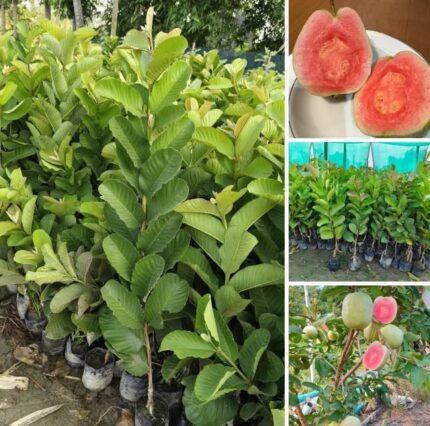Tree
- The avocado tree is a large, evergreen tree that typically grows between 10 to 20 meters in height.
- It has thick, leathery, and glossy dark green leaves that give the tree a dense appearance.
- The tree’s bark is rough and grayish, with a generally smooth texture when the tree is young.
- Avocado trees are slow-growing and can take several years to bear fruit, often around 4–5 years when grown from grafted trees.
Flowers
- The avocado plant produces small, yellow-green flowers in clusters. These flowers are dioecious, meaning male and female reproductive organs are located on different flowers.
- Avocado trees rely on pollinators, particularly bees, to transfer pollen between flowers.
Fruit
- Appearance: The fruit is typically pear-shaped, with a thick, leathery skin that can be green or purplish-black when ripe.
- Flesh: The inside of the avocado has a creamy, yellow-green flesh that surrounds a large, single seed (pit).
- Taste: Avocado flesh has a mild, nutty flavor and a smooth, buttery texture that makes it a favorite in various dishes, from salads to smoothies and sandwiches.
- Varieties: Some popular varieties of avocado in India include the Hass, Pinkerton, and Fuerte varieties. Hass is the most commonly cultivated type globally and is known for its rich taste and creamy texture.
Growth and Cultivation in India
- Climate:
- Avocados thrive in tropical and subtropical climates with mild temperatures ranging between 20°C to 30°C.
- In India, they grow well in the hilly regions of states such as Kerala, Tamil Nadu, Maharashtra, Andhra Pradesh, and Uttarakhand.
- Avocados require a frost-free climate and should be grown at elevations ranging from 300 meters to 1,200 meters above sea level.
- Soil:
- The avocado tree prefers well-drained, loamy or sandy soils with a slightly acidic to neutral pH (5.5 to 7.0).
- Soil rich in organic matter is ideal for better growth and fruiting.
- Propagation:
- Avocados are typically propagated by grafting to ensure the quality of the fruit and faster production.
- Seed propagation is also possible but results in longer wait times for fruiting, and the quality of the fruit may vary.
- Watering and Irrigation:
- While avocado trees are moderately drought-tolerant, they require regular watering, especially during dry spells.
- Drip irrigation is often used in commercial avocado farming to ensure deep watering while preventing waterlogging, which could lead to root rot.
- Pruning:
- Pruning is essential to maintain the shape of the tree, remove dead or diseased branches, and ensure the tree develops strong, healthy branches.
- Pruning also encourages better sunlight penetration, which improves fruit yield.
Uses and Benefits in India
- Nutritional Value:
- Avocados are incredibly nutritious, high in healthy monounsaturated fats, fiber, and essential vitamins and minerals, including vitamin K, vitamin E, vitamin C, B vitamins (especially folate), potassium, and magnesium.
- Despite being high in fat, avocados are considered heart-healthy due to their high levels of oleic acid, a monounsaturated fat that can help lower bad cholesterol levels.
- The fruit is also rich in antioxidants, which protect cells from oxidative stress and inflammation.
- Culinary Uses:
- Raw: Avocados are often eaten raw, in slices or mashed form, and are added to salads, sandwiches, or wraps.
- Guacamole: The most famous use of avocado in Indian cuisine and globally is in making guacamole, a flavorful dip or spread made with mashed avocado, lime juice, salt, and sometimes chopped tomatoes and onions.
- Smoothies & Shakes: The creamy texture of avocado makes it a popular ingredient in smoothies, milkshakes, and even ice cream.
- Baked Dishes: Avocados can also be incorporated into baked goods like muffins and cakes, where they provide moisture and richness.
- Savory Dishes: In Indian cooking, avocados can be used to add creaminess to curries or as a topping for parathas, chapatis, and even tacos or quesadillas.
- Medicinal Properties:
- Heart Health: The healthy fats found in avocados can help reduce the risk of heart disease by lowering bad cholesterol (LDL) and boosting good cholesterol (HDL).
- Weight Management: Despite their high calorie content, avocados can aid in weight management due to their fiber content, which promotes satiety and reduces overall calorie intake.
- Digestive Health: Avocados are high in dietary fiber, which helps in improving digestion and regularizing bowel movements.
- Anti-Inflammatory: The antioxidants and phytochemicals in avocados have anti-inflammatory properties, making them beneficial in managing conditions like arthritis.
- Cosmetic Uses:
- Avocado is often used in beauty products and DIY face masks due to its hydrating and nourishing properties for the skin.
- Avocado oil is rich in vitamins and essential fatty acids, making it a popular ingredient in hair oils, conditioners, and lotions.
Economic Importance in India
- Avocados are a relatively new crop in India, but their cultivation has been expanding due to growing demand for healthy foods in urban centers.
- The increasing popularity of international cuisines, including Mexican and Mediterranean dishes, has contributed to the rising demand for avocados in Indian markets.
- In addition to domestic consumption, India is beginning to export avocados to international markets, particularly in Europe and the Middle East, where demand for exotic fruits is high.
- Avocado farming provides an opportunity for farmers in hilly and less fertile regions to diversify their crops and generate additional income.
Pests and Diseases
Avocado trees, like all fruit crops, are susceptible to a range of pests and diseases, including:
- Root Rot: Caused by fungal infections, especially when the soil is poorly drained or too wet.
- Mango Weevils and Aphids: These pests feed on the tree’s leaves and can stunt growth.
- Avocado Moth: This pest targets the fruit, causing damage and affecting yield.
Farmers often use organic pest control methods and ensure proper irrigation and soil management practices to mitigate these issues.
Varieties of Avocados in India
- Hass: The most commonly cultivated avocado variety globally, known for its creamy texture and rich flavor.
- Fuerte: A pear-shaped variety that has a smooth, green skin and a milder flavor than Hass.
- Pinkerton: Known for its elongated shape, smooth texture, and high oil content.
Avocado is considered a superfood in modern diets due to its rich nutritional profile and versatility in cooking. Its popularity is growing steadily in India, and with increasing awareness of its health benefits, more Indian farmers are looking to cultivate this fruit.











Reviews
Clear filtersThere are no reviews yet.